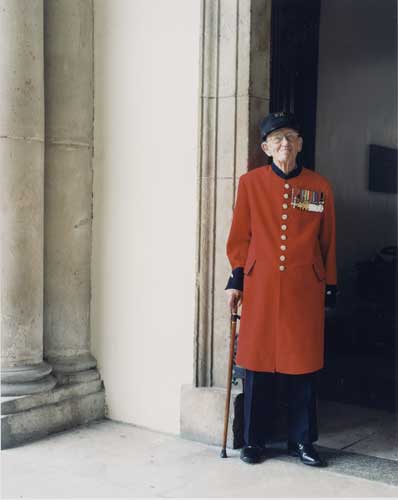Credo: William Lennard, Chelsea pensioner, 87

Your support helps us to tell the story
From reproductive rights to climate change to Big Tech, The Independent is on the ground when the story is developing. Whether it's investigating the financials of Elon Musk's pro-Trump PAC or producing our latest documentary, 'The A Word', which shines a light on the American women fighting for reproductive rights, we know how important it is to parse out the facts from the messaging.
At such a critical moment in US history, we need reporters on the ground. Your donation allows us to keep sending journalists to speak to both sides of the story.
The Independent is trusted by Americans across the entire political spectrum. And unlike many other quality news outlets, we choose not to lock Americans out of our reporting and analysis with paywalls. We believe quality journalism should be available to everyone, paid for by those who can afford it.
Your support makes all the difference.I believe...
I'm very happy being a Chelsea pensioner – I've got good friends here [at the Royal Hospital Chelsea]. I decided to become one after my wife died. When people see me in the uniform, they often come over and ask me to explain my medals and want a photo taken. There's an unwritten rule at the hospital that you have to be polite.
I joined the Territorial Army at the age of 15 as I wanted a holiday. I was a post-office messenger boy in the City, and as a junior you couldn't get a holiday in the summer. So another chap and I decided to join up, go to camp by the seaside and get the sun.
I was just 19 when the war started, but I don't think I was too young. We weren't daft; we knew something was in the air.
I would be dead if it weren't for a particular sergeant. When we were going from Tripoli to Sicily, he heard something, got hold of me and threw me across the road out of a truck's way. He was later my best man and I looked after his family after he died.
We were not supposed to have chemical warfare in the Second World War, but we did. I ended up as an instructor in chemical warfare. When I was in Italy, the Germans sank a ship carrying mustard gas, which went into the water and affected the children paddling in it. I was sent to advise the surgeons, because the little children were covered in blisters all over their legs.
It was hard to be away from my fiancée for six years, but you couldn't be sentimental about it – we had a job to do.
I almost didn't make it. I was wounded in Tobruk and had a piece of shell in my side. I went to the field-ambulance place and they wouldn't take it out because they were afraid it might tear things on the inside.
It's important for people to know about the Second World War. Only recently I gave a talk in my great-granddaughter's junior school about what it meant to be in the war. I was glad to see they were interested.
My proudest moment was getting an MBE [for services to the Finsbury Rifles Old Comrades Association]. I'd never expected that.
Join our commenting forum
Join thought-provoking conversations, follow other Independent readers and see their replies
Comments